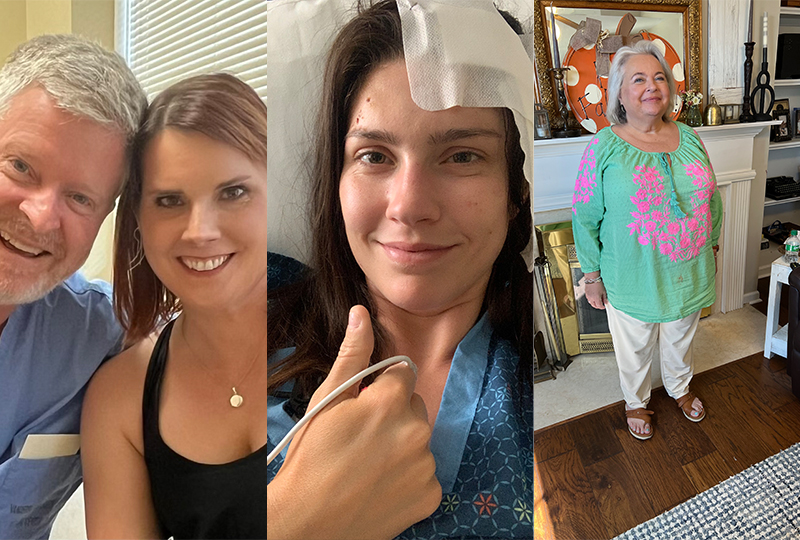Three women who took their health into their own hands share their stories.
When it comes to your health, no one is more invested than you are. And because getting a proper diagnosis can sometimes be tricky, it’s important to advocate for yourself when seeking care. As evidenced by the following stories of three Vanderbilt Neurosurgery patients, you should always listen to your gut — and your mother.
Mom’s always right
A busy mother of three, Christen Dowdy was about to cancel an appointment with a neurologist for recurring headaches when her mom intervened.
“She had had a hemorrhagic stroke years prior and was adamant I go,” Dowdy said.
The appointment led to testing that uncovered a diagnosis Dowdy hadn’t prepared for: a tumor on her brain called a meningioma.
It wasn’t what had been causing her headaches — those turned out to be hormonal in nature — but because the meningioma was growing, Dr. Peter Morone with Vanderbilt Neurosurgery recommended a procedure to remove the tumor. The move saved Dowdy from potentially life-altering side effects, such as hearing loss, vision loss and seizures.
Although she was hesitant to have brain surgery, Dowdy says the recovery process was much simpler than she expected.
“The next weekend, I was at my son’s baseball game,” she said. “I couldn’t believe it. I’m so thankful for Dr. Morone and the whole Vanderbilt team.”
Music to her ears
“Even if you think, ‘If I can’t really explain what’s going on, how am I going to get help?’ push that aside. Just explain it the best you can, and hopefully the right people pick up on that and carry you along.”
Greenbrier resident Valerie Necci also had a meningioma, but unlike Dowdy’s, hers was causing symptoms.
“I kept having these episodes where I felt really weird,” Necci said. “I would get sweaty and I had trouble finding words, and I would talk nonsense.”
During one episode, she called her husband, Ryan, a musician, who was touring at the time out of state.
“He called 911; he thought I was having a stroke,” Necci said.
But when EMS arrived, she was feeling better, and her symptoms had subsided. Rather than be transported to the ER, Necci decided to follow up with her primary care physician, who suggested perhaps the episode was an anxiety attack.
A couple months later, Necci was at a friend’s house and started hearing loud music.
“I asked him to turn down the song, but he said there wasn’t any music on,” she said.
That’s when Necci’s doctor ordered a CT scan.
“She literally called me on my drive home from the scan and told me they found a mass and she wanted to get me in for an MRI as soon as possible,” Necci said.
It turns out the episodes Necci was having were likely focal seizures caused by the meningioma. A little more than a week after her MRI, Dr. Reid Thompson removed the tumor via craniotomy. Afterward, when Thompson came to check on her, Necci told him she was experiencing double vision, a common side effect of the procedure that usually resolves itself.
“And then, unprompted, we both just started singing ‘Double Vision’ by Foreigner,” she said. “It was funny and fun and special.”
Necci says she has since made it her mission to educate people on how important it is to advocate for yourself.
“Even if you think, ‘If I can’t really explain what’s going on, how am I going to get help?’ push that aside.’ It doesn’t matter,” she said. “Just explain it the best you can, and hopefully the right people pick up on that and carry you along.”
Small tumor, big problems
Despite efforts to the contrary, Paula Richey’s weight had creeped up over about four years, and she had developed high blood pressure and diabetes. Out of options, she decided to have weight loss surgery.
So when her weight loss stalled at 40 pounds following surgery, she felt like a failure. After all, she had expected to lose about 100 pounds.
Then, at a post-surgical weigh-in, an advanced practice registered nurse asked Richey if she’d ever been diagnosed with Cushing disease, which is a collection of symptoms that develop in response to having excess cortisol hormone for a prolonged period of time. It’s most often caused by a pituitary tumor.
Even with the tip, it was another few months before Richey received an official diagnosis. Nothing showed up on MRI, so her local endocrinologist (Richey lives in Kentucky) referred her to Vanderbilt for a specialty procedure that’s used to diagnose Cushing disease. The results were positive.
In December 2022, Dr. Lola Chambless performed surgery to remove the 3-millimeter tumor on Richey’s pituitary gland that had been the cause of her symptoms. Soon, Richey’s blood pressure and glucose levels normalized, and she was able to stop taking her medication. Her weight loss resumed as well.
Richey says she’s grateful for everyone at Vanderbilt who believed in her and hopes others can learn from her experience to advocate for yourself.
“If it can help someone else feel like they’re not crazy when they think something is wrong and to keep looking for answers, then it’s worth sharing my story,” she said.

Personalized Care for Brain Tumors
Vanderbilt’s Brain Tumor program is a national leader in research and clinical trials, providing access to innovative treatment options and technologies not available elsewhere. Vanderbilt’s team of experts works together to provide personalized care tailored to each patient’s unique needs, and patient care coordinators are there to help every step of the way.

